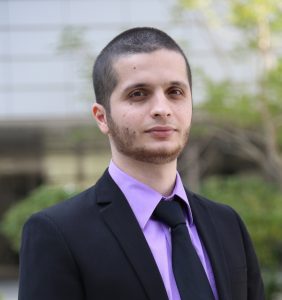 Speaker: Mohammad Alhawari, Post-Doctoral Research Fellow at Khalifa University of Science and Technology
Speaker: Mohammad Alhawari, Post-Doctoral Research Fellow at Khalifa University of Science and Technology
Title: Energy Harvesting Interface Circuits for Biomedical Wearable Electronics
Abstract: The ever increasing demand for computing and communications, especially for wearable devices, coupled with some of the unique applications that require non interruptible operation dictates a need for innovation in energy harvesting and power management. Further, the advancement in circuit design, systems and communication with semiconductor technology scaling have enabled ultra-low power systems in the range of micro to nano watt. This development along with the need for near perpetual operations, especially for biomedical wearable devices, low cost and small size for such systems bring new challenges to energy sources and power managements. Furthermore, the single digit improvement in battery technology, the main energy source for powering up portable devices, has resulted in increase the focus on energy harvesting to power such systems. In addition, the low duty cycle operation for some applications has enabled the innovation in energy harvesting and power management which has become an available option to overcome the energy limitation of batteries. Human body heat offers continues source of energy which could be useful to power wearable devices. This energy can be harvested using thermoelectric generator (TEG) which is based on Seebeck effect. A smart interface circuits are needed to harvest from the TEG and to provide a suitable voltage and power to the load with high efficiency. In this talk, I will explain my recent research in the area of energy harvesting for biomedical wearable electronics. This includes the design of high-gain inductor-based DC-DC converter along with the required control circuitry. The control uses a zero current switching technique to maintain a high efficiency of the converter with minimum overhead. In addition, an auto-polarity method is introduced which overcome the challenges in the conventional technique for low voltage applications. Finally, I will remark on the current and future challenges of energy harvesting in the IoT era.
Bio: Mohammad Alhawari is a post-doctoral research fellow at Khalifa University of Science and Technology. He received the PhD degree in electrical and computer engineering from Khalifa University of Science and Technology, Abu Dhabi, in 2016. He also received the M.S. degree in microsystems engineering from Masdar Institute of Science and Technology, Abu Dhabi, in 2012 and the B.S. degree in electronic engineering from Yarmouk University, Jordan, in 2008. He has published many papers in the field of mixed signal circuit design toward low power wearable applications. This includes top tier conferences and journals such as ISSCC, JSSC, ISCAS, TCAS etc. He holds one patent and two pending patents. He also has one chapter in IoT application and one authored book under preparation in energy harvesting area. His research interest lies in the area of low power designs for energy harvesting, power converters and power management units, analog front end for biomedical applications, biomedical sensors, power delivery and storage.